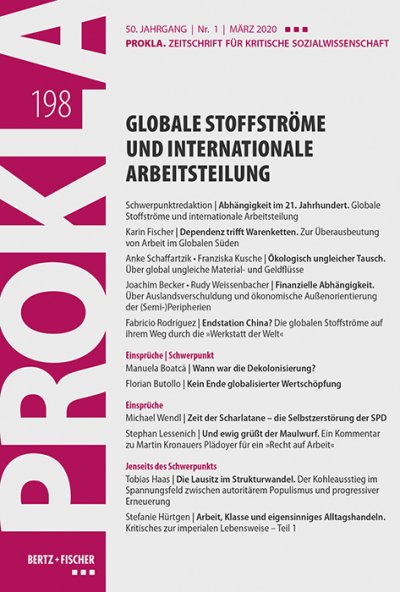Wann war die Dekolonisierung?
Denk-Zettel aus der Karibik
DOI:
https://doi.org/10.32387/prokla.v50i198.1861Schlagworte:
Kolonialität, Dekolonialisierung, Karibik, Staatsbürgerschaft, Abhängigkeiten, BrexitAbstract
Der Artikel diskutiert am Beispiel der Karibik einige der Paradoxien der (De-)Kolonisierung im 21. Jahrhundert als Kennzeichen eines ungleichen modernen/kolonialen Weltsystems, für die es bisher nur rudimentäre globale Lösungen gibt. Die Karibik hat die längste Geschichte kolonialer Verflechtungen mit Europa und ist damit auch die periphere Region mit den ausgeprägtesten Abhängigkeiten von den Zentren des Weltsystems. Sie enthält bis heute Überseegebiete, die administrativ zu den USA gehören, sowie über ein Drittel der Territorien, die immer noch von europäischen Staaten regiert werden. Vergessene europäische Grenzen noch kolonisierter europäischer Territorien in der Karibik und der Verkauf von Staatsbürgerschaftsrechten im Falle unabhängiger karibischer Gebiete verkomplizieren das Narrativ einer abgeschlossenen administrativen Dekolonisierung. Sichtbar werden solche Paradoxien häufig erst in Krisensituationen, etwa angesichts sogenannter Naturkatastrophen oder politischen Entscheidungen wie dem Brexit. Sie zeigen, dass die Kolonialität der Macht sowohl in ehemals kolonisierten als auch in noch besetzten Gebieten Situationen von Abhängigkeit herstellt.
Downloads
Literaturhinweise
Best Citizenship (2019): Citizenship by investment became cheaper after 2017. URL: http://best-citizenships.com/2019/10/22/citizenship-by-investment-became-cheaper-after-2017, Zugriff: 22.10.2019.
Bhabha, Homi K. (1990): DissemiNation: time, narrative, and the margins of the modern nation. In: Bhabha, Homi (Hg.): Nation and Narration. London: 291-322.
Boatcă, Manuela (2016): Kapital aus Staatsbürgerschaft und die globale Strukturierung des Nationalen. In: Bude, Heinz / Staab, Philipp (Hg.): Kapitalismus und Ungleichheit. Die neuen Verwerfungen. Frankfurt/M.: 137–153.
– (2019): Coloniality of Citizenship and Occidentalist Epistemology. In: Dversia. Sonderheft Decolonial Theory & Practice in Southeast Europe. 3(19): 55-77.
Bonilla, Yarimar (2015): Non-Sovereign Futures. French Caribbean Politics in the Wake of Disenchantment. Chicago. DOI: https://doi.org/10.7208/chicago/9780226283951.001.0001.
Cardoso, Fernando Henrique (1985): Estado y Sociedad en América Latina. Buenos.
CARICOM Reparations Commission (2014): The Caricom Reparations Commission Ten Point Action Plan. URL: http://caricomreparations.org/caricom/caricoms-10-point-reparation-plan, Zugriff: 10.5.2019.
Castro-Gómez, Santiago (2002): The Social Sciences, Epistemic Violence, and the Problem of the Invention of the Other. In: Nepantla: Views from South 3(2): 269-285.
Corpocrat (2018): New Moldova Citizenship by Investment Program. URL: https://corpocrat.com/2018/07/13/new- moldova-citizenship-by-investment-program- mcbi, Zugriff: 11.09.2019.
Džankić, Jelena (2012): The pros and cons of ius pecuniae: investor citizenship in comparative perspective. EUI Working Paper RSCAS 2012/14. European University Institute. Florence.
Frank, André Gunder (1969): Die Entwicklung der Unterentwicklung. In: Frank, Andre Gunder / Marini, Mauro / Vitale, Luis (Hg.): Kritik des bürgerlichen Anti-Imperialismus. Berlin: 30-45.
Government of Anguilla London Office (2017): Anguilla & Brexit. Britain’s Forgotten EU Border. URL: https://westindiacommittee.org/wp-content/uploads/2017/06/The-White-Paper-on-Anguilla-and-Brexit-1.pdf, Zugriff: 15.12.2019.
Grosfoguel, Ramón / Cervantes-Rodríguez, Margarita / Mielants, Eric (2009): Introduction. Caribbean Migrations to Western Europe and the United States. In: dies. (Hrsg.): Caribbean Migration to Western Europe and the United States. Essays on Incorporation, Identity, and Citizenship. Philadelphia: 1-17.
Investment Migration Insider (2019): Dominica CIP Approved 2,100 Applications in Last 12 Months, Likely a World Record. URL: https://www.imidaily.com/caribbean/dominica-cip-approved-2100-applications-in-last-12-months-likely-a-world-record. Zugriff: 22.12.2019.
Henley&Partners (2019): Henley Passport Index and Global Mobility Report. Henleyglobal.com. URL: https://www.henleyglobal.com/henley-passport-index. Zugriff: 15.12.2019.
Knight, Franklin W. / Palmer, Colin A. (Hg.) (1989): The Modern Caribbean. Chapel Hill.
Lewis, Linden (Hg.) (2013): Caribbean Sovereignty, Development and Democracy in an Age of Globalization. New York. DOI: https://doi.org/10.4324/9780203110317.
Marini, Rui Mauro (1969): Unterentwicklung und Revolution in Lateinamerika. Versuch einer marxistischen Interpretation. In: Frank, André Gunder / Marini, Mauro / Vitale, Luis (Hg.): Kritik des bürgerlichen Anti-Imperialismus. Berlin: 45-66.
Mignolo, Walter (2000): Local Histories/Global Designs. Coloniality, Subaltern Knowledges, and Border Thinking. Princeton.
– (2007): The Rhetoric of Modernity, the Logic of Coloniality and the Grammar of De-Coloniality. In: Cultural Studies. 21(2-3): 449-513. DOI: https://10.1080/09502380601162647.
Mintz, Sydney (1978): Was the Plantation Slave a Proletarian? In: Review. Journal of the Fernand Braudel Center. II(1): 81–98.
Prakash, Gyan (1994): Introduction: after colonialism. In: ders. (Hg.): After colonialism: Imperial histories and postcolonial displacements: Princeton: 3-18. DOI: https://10.2307/j.ctt7t242.4.
Quijano, Aníbal (2016): Kolonialität der Macht, Eurozentrismus und Lateinamerika. Wien.
– / Wallerstein, Immanuel (1992): Americanity as a Concept, or the Americas in the Modern World-System. In: International Journal of the Social Sciences. 134(4): 549–57.
Rauhut, Claudia (2018): Mobilizing Transnational Agency for Slavery Reparations: The Case of Jamaica. In: Journal of African American History. 103(1-2): 133-162. DOI: https://10.1086/696334.
– / Boatcă, Manuela (2019): Globale Ungleichheiten in der longue durée. Kolonialismus, Sklaverei und Forderungen nach Wiedergutmachung. In: Fischer, Karin/ Grandner, Margarete (Hg.): Globale Ungleichheit. Über Zusammenhänge von Kolonialismus, Arbeitsverhältnissen und Naturverbrauch. Wien: 94-108.
Reuters (2012): Passports ... for a Price. URL: http://www.reuters.com/article/2012/02/13/us-passport-idUSTRE81B05A20120213, Zugriff: 22.12.2019.
Statistik Austria (2019): Eingebürgerte Personen im Inland seit 2007 nach dem Rechtsgrund. URL : http://statistik.at/web_de/statistiken/menschen_und_gesellschaft/bevoelkerung/einbuergerungen/index.html, Zugriff: 22.12.2019.
Tomich, Dale (1991) World Slavery and Caribbean Capitalism. In: Theory and Society 20(3): 297–319. DOI: https://10.1007/BF00213549.
Transparency International (2018): European Getaway: Inside the murky world of golden visas. URL: Transparency.org. https://www.transparency.org/whatwedo/ publication/golden visas, Zugriff: 11.12.2019.
Van Amersfoort, Hans / Van Niekerk, Mies (2006): Immigration as a colonial inheritance: Post-colonial immigrants in the Netherlands, 1945–2002. In: Journal of Ethnic and Migration Studies 32(3): 323-346. DOI: https://10.1080/13691830600555210.
Vitale, Luis (1969): Ist Lateinamerika feudal oder kapitalistisch? Brauchen wir eine bürgerliche oder eine sozialistische Revolution. In: Frank, André Gunder/ Marini, Mauro/ Vitale, Luis (Hg.): Kritik des bürgerlichen Anti-Imperialismus. Berlin: 67-91.
Webber, Oscar (2019): The Plantation’s Role in Enhancing Hurricane Vulnerability in the Nineteenth Century British Caribbean. URL: http://www.alternautas.net/blog/2018/9/20/the-plantations-role-in-enhancing-hurricane-vulnerability-in-the-nineteenth-century-british-caribbean, Zugriff: 15.12.2019.






